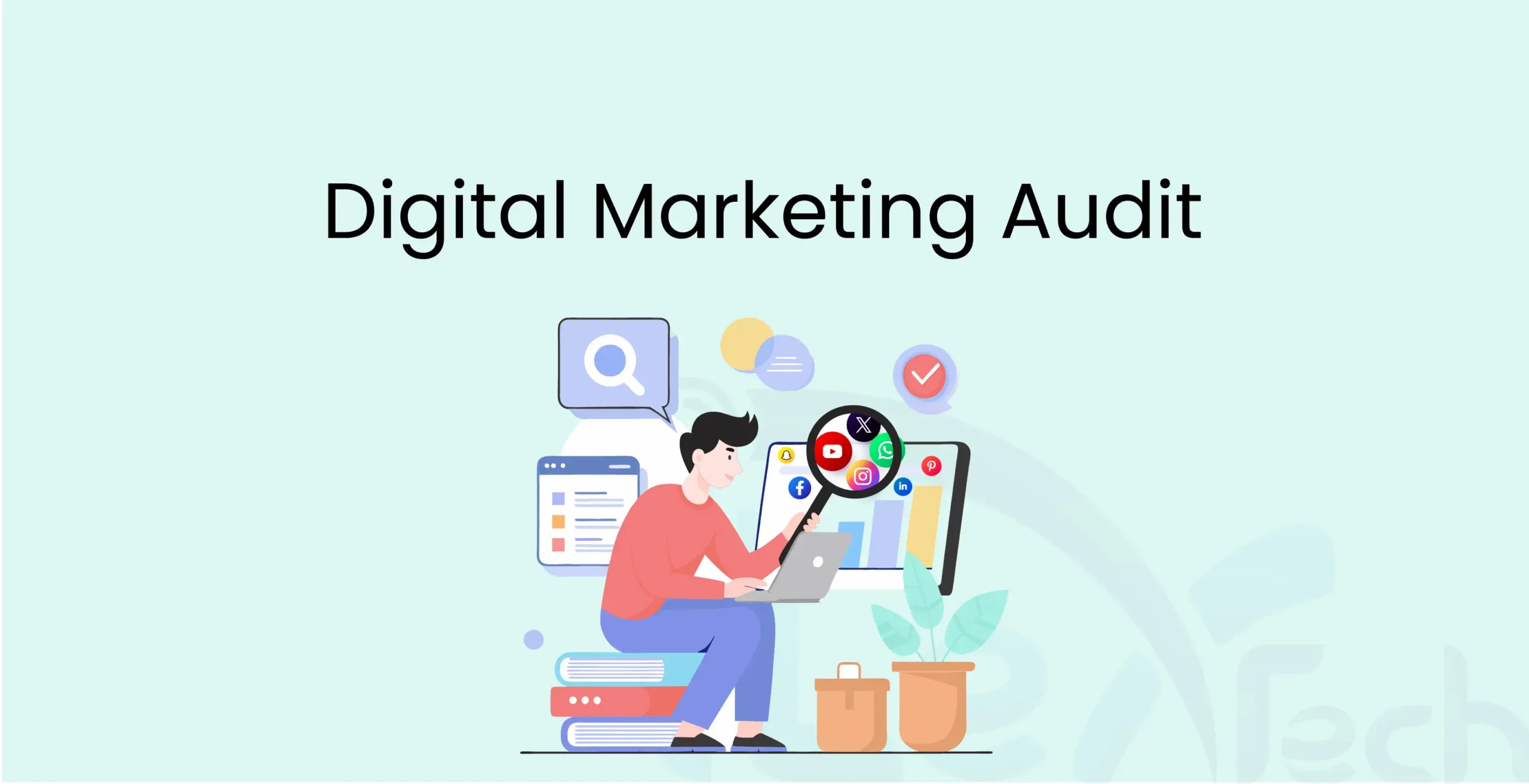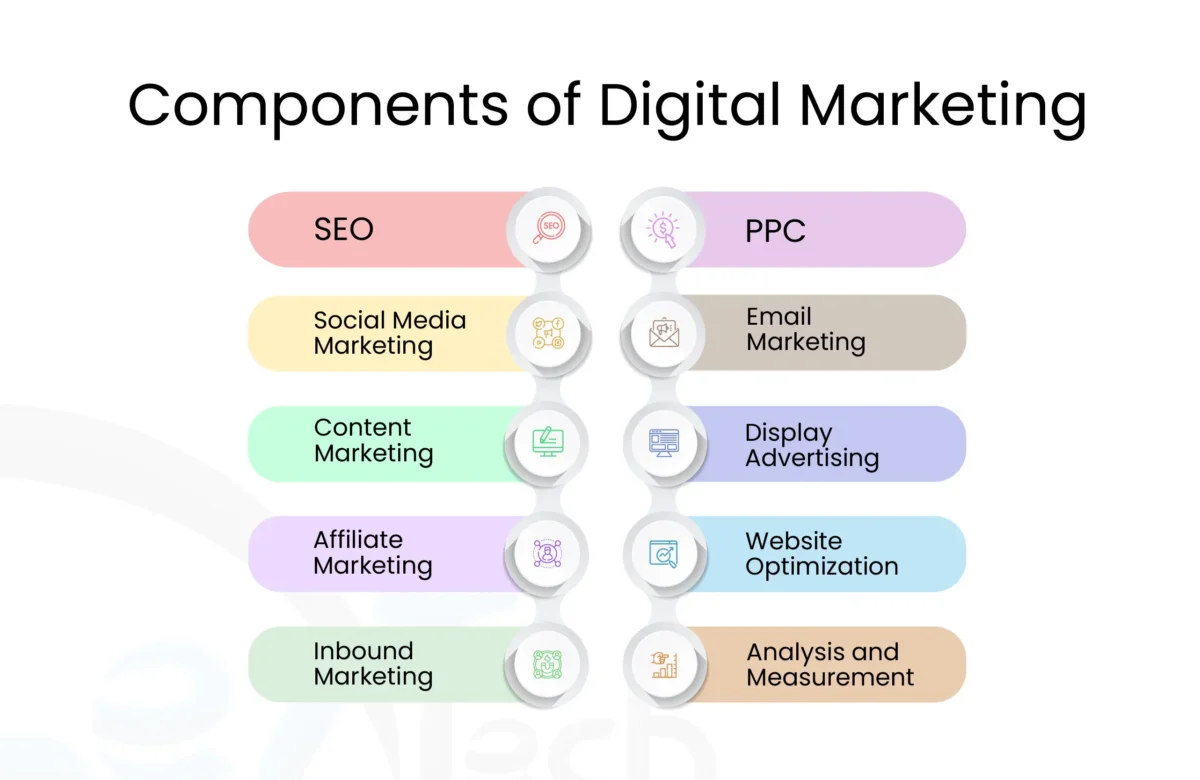A ‘Digital Marketing Audit’ is essential to determine gaps and inefficiencies in your online strategies. It enhances performance and unearths new growth opportunities by providing data-driven insights into your digital marketing efforts. Let’s know more about this trending topic with us.
What is Digital Marketing Audit?
A digital marketing audit is an all-round check of all online marketing activities a business uses to reach its audience, advertise its products or services, and meet its overall marketing goals. It examines every aspect of your online presence from website to social media channels, email campaigns, SEO results, content plan, and paid ads.
It is really about showing what is working well, what needs to be better, and how your business can align its online efforts with your main goals. Unlike a regular marketing report that usually looks at specific campaign results, a digital marketing audit takes a broader view.
A digital marketing audit is going to look at everything that’s good and bad with your whole digital plan. Other than that, an audit helps businesses make smart choices, improve their work, and ensure that their digital marketing spending provides the best ROI.
Benefits of a Digital Marketing Audit
Conducting a digital marketing audit is essential for businesses of all sizes. Instead, those that rely heavily on digital channels to drive revenue. So, let’s know about some of the key benefits:
1. Improved Performance and Efficiency
An audit can help you see where your strategy is not working so well. It will help you find: ads that are not getting you too much, content that may not be well-optimized, or landing pages that don’t convert much. Also, an audit shows areas that might need some changes. In short, you can help businesses do better in their campaigns and become more efficient in general.
2. Better Alignment with Business Goals
Often, there are too many digital channels of marketing, and an investment in these various channels is made without proper alignment with the business goals. Similarly, an audit makes sure that your marketing strategies are directly contributing to your objectives in brand awareness, leads generation, or customer retention.
3. Competitive Analysis
One of the significant benefits of a digital marketing audit is the ability to conduct a detailed competitor analysis. By understanding how your competitors are performing online, you can identify areas where you can outperform them or spot trends and strategies you should adopt.
4. Enhanced ROI
A marketing audit can reveal where you’re spending too much money and not getting the desired returns. As a result, you can stretch your budget further, ensuring every dollar spent on marketing is yielding the highest possible ROI.
5. Uncover New Opportunities
Digital marketing trends keep changing. When you check your marketing, you may find new ways, strategies, or tools you haven’t tried yet, like programmatic advertising, voice search optimization, or using new social media platforms. This will keep your brand updated and in touch with new people.
6. SEO Optimization
Audits often show problems in your search engine optimization (SEO) strategies. This helps you find your weak areas in keyword targeting, content structure, or technical SEO parts. Because of this, you can make your website more visible. As a result, you will rank better in search engine results pages (SERPs).
7. Improved User Experience
A big part of the audit is how well customers understand your digital platforms and how they use them. Making the user experience better, like improving site speed, navigation, and mobile responsiveness, helps customers have a smooth experience. This often results in higher conversion rates.
How to Perform a Digital Marketing Audit
Performing a digital marketing audit might seem like a daunting task. But you can break it down into steps that can make the process manageable and effective. Here’s a step-by-step guide on how to conduct a thorough audit:
1. Define Your Objectives
Obviously, one must define the goal of an audit in advance. Improve SEO? Make paid ads better? Increase social media engagement? Setting a goal will guide the audit and make you keep your focus on the most important things.
2. Analyze Your Website
Your website is the base of your marketing. Check how well it works, like how fast it loads, if it works well on mobile, and how users feel when using it. Also, use tools like Google Analytics and SEMrush to see how visitors interact with your site, which pages are doing well, and where users leave.
3. Evaluate SEO Efforts
SEO is very important for bringing free visitors to your website. When you check your site, look at your keyword plan, meta tags, backlinks, and how your site is organized. Tools like Ahrefs, Moz, and Screaming Frog can help you find chances and problems in your SEO.
4. Assess Content Marketing Strategy
Review your content library to ensure it aligns with your brand voice, provides value to your audience, and is optimized for search engines. In addition, check which types of content (blogs, videos, infographics) perform best and identify any gaps or outdated content that needs refreshing.
5. Examine Social Media Performance
For most organizations, social media is the bottom layer of the digital marketing cake. So look at your presence on all applicable platforms during the audit, such as Facebook, Instagram, LinkedIn, X, and YouTube.
Also, consider engagement metrics like likes, comments, shares, and followers. At the same time, also consider whether or not that content is actually going in front of the right audience and driving traffic back to your actual site.
6. Review Email Marketing Campaigns
Analyze how your email campaigns are doing. Check open rates, click-through rates, and conversion rates. Look for better organization of your email list, improved subject lines, and quality content so you can deliver more personalized and interesting messages to your subscribers.
7. Analyze Paid Advertising (PPC)
If you’re advertising through ads on Google, Facebook, and LinkedIn, paid advertisement frequently delivers an enormous volume of people along with sales. Make audits with CPC, ROAS as well as the whole average conversion rates for every one of your ad campaigns; identify those that are not performing well, and either their targeting or ad text should be modified accordingly.
8. Evaluate the Customer Journey
This would help improve the overall customer experience by understanding how customers interact with your brand online mapping awareness to consideration to conversion and identifying those points where customers might be dropping off.
We Do Auditing For?
At Ilextech, we center our focus on carrying out digital marketing checks for lots of businesses, from startups to big companies. Our goal is to provide you with useful ideas that help you improve your marketing work, increase performance, and foster growth. We will carry out checks on:
- Small Businesses: We tailor audits to help small businesses optimize their online presence and drive local traffic.
- E-commerce Companies: We focus on improving conversion rates, customer retention, and overall online sales.
- SaaS Companies: Our audits help software-as-a-service companies boost lead generation. Also, to help them nurture potential customers through targeted digital marketing efforts.
- Nonprofits and NGOs: We provide strategic audits to aid non-profit organizations to amplify their message. This allows them to connect with their communities more effectively through online means.
IlexTech Digital Marketing Audit Checklist
At IlexTech, we follow a comprehensive checklist to ensure your audit covers all critical aspects of your digital marketing strategy. Here’s a look at our crucial audit areas:
1. Website Performance
✔️ Site speed and load times
✔️ Mobile-friendliness
✔️ User experience and navigation
✔️ Conversion rate optimization (CRO)
✔️ Call-to-action (CTA) effectiveness
2. SEO Analysis
✔️ Keyword rankings and visibility
✔️ Technical SEO health (site structure, meta tags, alt tags)
✔️ Backlink profile
✔️ Competitor SEO comparison
3. Content Marketing
✔️ Content quality and relevance
✔️ Frequency of publishing
✔️ Engagement metrics. For example, shares, comments, and likes
✔️ Alignment with business objectives
4. Social Media Audit
✔️ Channel performance. For instance, followers and user engagement
✔️ Paid social performance
✔️ Content strategy effectiveness
✔️ Audience targeting and demographics
5. Paid Advertising
✔️ ROI on PPC campaigns
✔️ Conversion tracking and attribution
✔️ Bidding strategies and Ad targeting
✔️ Ad creative and messaging
6. Email Marketing
✔️ Open rates and click-through rates
✔️ Email list segmentation and personalization
✔️ Subject line effectiveness
✔️ Conversion and sales tracking
Characteristics of a Strong Digital Marketing Audit
A solid digital marketing audit is thorough, data-driven, and provides actionable insights. Here are the characteristics of a successful audit:
1. Comprehensive
A thorough audit of your digital marketing plan checks everything out, starting with your website and all your social media channels. Each part should be examined carefully to ensure nothing is missed.
2. Data-Driven
A successful audit relies on accurate data and analytics. Rather than relying on assumptions or gut feelings, the audit should use data from tools like Google Analytics, SEMrush, and Moz to provide a clear picture of what’s working and what isn’t.
3. Objective
The audit should be fair and objective, offering honest feedback on areas that require improvement in your digital marketing strategy. It is straightforward to fall in love with certain strategies, but an audit forces you to confront what’s not delivering any actual results.
4. Actionable Insights
A good audit doesn’t just point out problems—it provides solutions. At the end of the audit, you should have a clear action plan for how to address any issues that were uncovered.
5. Future-Oriented
Digital marketing is always changing. Therefore, an audit needs to be focused on the future. That is, it needs to foresee future trends and the technologies that will lead your business ahead in the coming years.
6. Customized to Your Business
Every business has its unique characteristics. That’s why every audit is different. A good audit, therefore, should always take into account the specific industry, audience, and organization’s objectives to deliver custom recommendations that will have the maximum impact.
In summary, a digital marketing audit is important for making businesses compete strongly by providing an overview that pinpoints gaps and improvement areas. The audit, SEO, content, social media, and ads ensure actionable recommendations toward growth. All this insight will make the brand flexible & innovative and make informed decisions for long-term success in the digital world!
FAQs
What does a digital audit do?
A digital audit reviews all aspects of a business’s online presence, from website performance to social media effectiveness, identifying areas for improvement. It helps to optimize digital channels to enhance user experience, engagement, and conversions.
What does a marketing audit do?
A marketing audit evaluates a company’s marketing strategies, tactics, and goals to ensure they align with overall business objectives. It identifies the strengths, weaknesses, and growth opportunities to boost marketing efficiency.
What is a digital brand audit?
A digital brand audit analyzes how a brand is perceived online, assessing its reputation, messaging, and visual identity. It ensures brand consistency across digital channels, helping improve trust and engagement with the audience.



